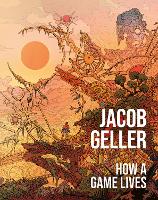


|
|
| book details |
How a Game Lives
By (author) Jacob Geller

|
This book is currently unavailable. Enquire to check if we can source a used copy
|
| book description |
Over his illustrious career, Jacob Geller has written and produced a sprawling collection of video essays. Deftly interweaving video game analysis with complex narratives about art, politics and history, Geller’s work positions games as vital tools for understanding each other and ourselves. How a Game Lives re-examines ten of Geller’s most iconic essays accompanied by his brand-new commentary, afterwords on each piece by some of the industry’s best writers and stunning original artwork by Kilian Eng and other exceptional artists. With videos like “Who’s Afraid of Modern Art?â€, “Every Zelda is the Darkest Zeldaâ€, and “The Legacy of the Haunted Houseâ€, Geller has taught audiences how to think about the art that’s affected them. How a Game Lives immortalises those works and more and provides boundless insight into the construction, philosophy, and afterlife of each essay. Featuring original scripts and new industry analysis of the following works: Who’s Afraid of Modern Art? Returnal is a Hell of Our Own Creation Control, Anatomy, and the Legacy of the Haunted House Does Call of Duty Believe in Anything? The Decade-Long Quest for Shadow of the Colossus’ Last Great Secret Every Zelda is the Darkest Zelda Art in the Pre-Apocalypse The Golem and the Jewish Superhero The Future of Writing about Games Fear of Cold
| product details |
Normally shipped |
Publisher | HarperCollins Publishers
Published date | 20 Nov 2025
Language |
Format | Hardback
Pages | 208
Dimensions | 247 x 196 x 16mm (L x W x H)
Weight | 270g
ISBN | 978-0-0087-5229-3
Readership Age |
BISAC | games / reference
| other options |
|
|
|
To view the items in your trolley please sign in.
| sign in |
|
|
|
| specials |
|
|
This first comprehensive biography of Cecil Rhodes in a generation illuminates Rhodes’s vision for the expansion of imperialism in southern Africa, connecting politics and industry to internal development, and examines how this fueled a lasting, white-dominated colonial society.
|
Let's stare the future down and, instead of fearing AI, become solutionists.
|
|
|
|
|